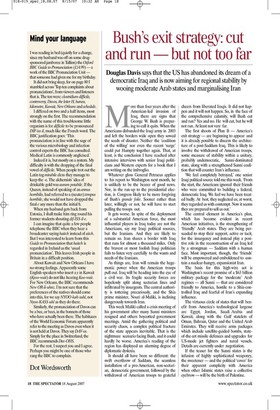Mind your language
I was reading in bed (quietly for a change, since my husband was off on some drugsponsored jamboree in Tallinn) the Oxford BBC Guide to Pronunciation (£14.99) — a work of the BBC Pronunciation Unit — that someone had given me for my birthday.
It did not bring sleep, for on page 801 stumbled across 'Top ten complaints about pronunciations', from viewers and listeners that is. The ten were: clostridium difficile, controversy, Davos, the letter H, harass, kilometre, Kuwait, New Orleans and schedule.
I differed on two and a half items, most strongly on the first. The recommendation with the name of this troublesome little organism is for difficile to be pronounced DIF-iss-il, much like the French word. The BBC justification goes: 'This pronunciation is in line with the sage of the various microbiology and infection control experts the BBC has consulted. Medical Latin is commonly anglicised.'
Indeed it is, but mostly on a system. My difficulty is with the dropping of the final vowel of difficile. When people trot out the Latin tag mira bile dictu they manage to keep the -e. The alchemists' idea of drinkable gold was auntm potabile. If the Queen, instead of speaking of an annus honibilis, had referred to a (neuter) tempus horribile, she would not have dropped the final e any more than the initial h.
When my husband gets back from Estonia, I shall make him ring round his former students shouting dif-ISS-ibe.
I can imagine that quite a few people telephone the BBC when they hear a broadcaster saying ha itch instead of aitch. But I was interested to learn from this Guide to Pronunciation that ha itch is regarded in Ireland as the 'usual pronunciation'. This leaves Irish people in Britain in a difficult position.
About Kuwait and New Orleans I have no strong feelings. Apparently some English-speakers who insert ay in Kuwait (Kyoo-wait) do not like hearing Koo-wait. For New Orleans, the BBC recommends New OR-li-uhnz. I'm not sure that the preferences of the natives should come into this, for we say NY00-kah-suhl, not Nyoo-KASS-uhl as they do there.
Similarly, the pronunciation of Davos can be a bee, or bees, in the bonnets of those who have actually been there. The habituees of the World Economic Forum apparently refer to the meeting as Davos even when it is not held at Davos. They sayDAVos. Simply for the place in Switzerland, the BBC recommends Day-OHS.
For the rest, I suspect you and I agree. Perhaps you might be one of those who rang the BBC to complain.
Dot Wordsworth












































 Previous page
Previous page